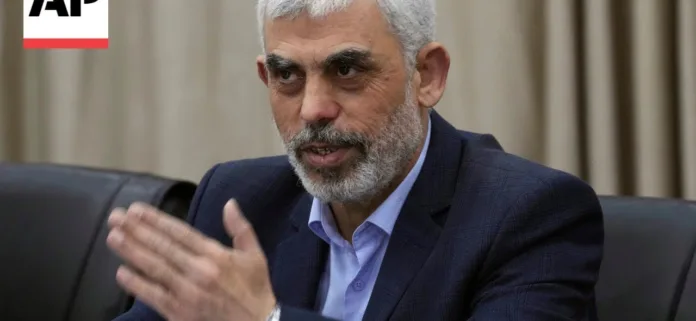Hamas figures, including Yahya Sinwar, face indictments for their roles in the deadly assault on Israel, marking the US’s first legal action against the perpetrators of the attack
The US Department of Justice has charged several prominent Hamas leaders, including Yahya Sinwar, in connection with the deadly attack on Israel that occurred on October 7 of last year. The indictment, which includes six Hamas members, outlines seven serious charges: murder of US citizens, conspiracy to finance terrorism, and the use of weapons of mass destruction.
This legal action represents the US’s first attempt to hold accountable the ringleaders behind the unprecedented assault on southern Israel, a massacre described by Attorney General Merrick Garland as the deadliest attack on Jews since the Holocaust. The assault resulted in over 1,200 Israeli deaths and the abduction of more than 250 individuals. The indictment also alleges that the group committed acts of sexual violence and other atrocities during the attack.
The justice department’s complaint includes a broad range of allegations, covering decades of purported Hamas activities aimed at undermining US and Israeli security. Among those charged are former Hamas leader Ismail Haniyeh, Marwan Issa, deputy leader of the armed wing, Khaled Mashaal, who oversees the group’s activities outside Gaza and the West Bank, and senior figures Mohammed Deif and Ali Baraka.
The indictment highlights that several of the defendants are either deceased or remain elusive, with reports indicating that Haniyeh, Issa, and Deif were killed in recent months, presumably by Israeli forces. Sinwar, who is believed to be hiding in Gaza, remains at large. Despite the deaths of some accused, the charges underscore a significant US effort to seek justice for the October 7 attack and other acts of terrorism attributed to Hamas.
The complaint, filed in February but kept confidential until now, seeks to hold the accused accountable for the murder of 42 American citizens and the hostage-taking of 10 individuals during the attack. Garland emphasized that the US is committed to investigating each instance of violence against American citizens as an act of terrorism.
In response to these charges, President Joe Biden condemned the Hamas attack and pledged that those responsible would be brought to justice. The US’s legal and diplomatic stance has implications for international relations and the ongoing conflict in the region.
In parallel, the UK has defended its recent decision to ban certain arms sales to Israel, driven by concerns over their potential use in Gaza. This decision reflects broader international debates about arms exports and their role in conflicts involving humanitarian crises.
The conflict, which began with the Hamas attack, has since escalated dramatically, with over 40,000 casualties reported in Gaza as a result of Israel’s subsequent military operations. The situation continues to be a focal point for international diplomacy and human rights discussions.
Analysis:
Political: The charges against Hamas leaders represent a significant political development, highlighting the US’s commitment to counter-terrorism and accountability in international conflicts. The indictment is a direct response to the October 7 attack, which has had profound geopolitical repercussions. It underscores the US’s role in seeking justice for terrorist acts and its broader strategy in the Middle East. The legal action also reflects tensions between the US and Hamas, influencing diplomatic relations and shaping the discourse around counter-terrorism efforts.
Social: The indictment and subsequent legal proceedings impact global social narratives about justice and terrorism. The charges serve as a critical statement on the US’s stance against groups that commit large-scale violence and human rights abuses. The emphasis on the attack’s severity and the murder of civilians aligns with broader societal concerns about terrorism, human rights, and the protection of innocent lives. This development influences public perceptions of the conflict and the international community’s responsibility to address such atrocities.
Racial: While the specific charges do not directly address racial issues, the broader context of the conflict involves racial and ethnic dimensions. The attack and the subsequent military responses have significant implications for Palestinian and Israeli populations, with racial and ethnic tensions exacerbating the conflict. The international community’s response, including legal actions and arms embargoes, intersects with discussions about racial justice and the ethical implications of supporting different sides in the conflict.
Gender: The attack’s reported use of sexual violence against women, including rape and genital mutilation, brings gender issues into sharp focus. These atrocities highlight the gender-based violence that can occur in conflict situations, impacting women and girls disproportionately. The indictment’s mention of these acts underscores the need to address gender violence in international conflicts and the responsibility of global actors to hold perpetrators accountable.
Economic: The legal actions against Hamas leaders and the UK’s arms export ban have significant economic implications. The indictment could impact economic relations between the US and countries involved in the conflict, influencing trade and defence industries. The UK’s decision to restrict arms sales to Israel reflects concerns about the economic role of arms exports in conflict zones and the broader impact of such decisions on international trade and economic relationships.
